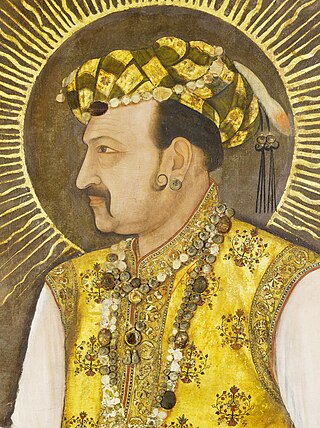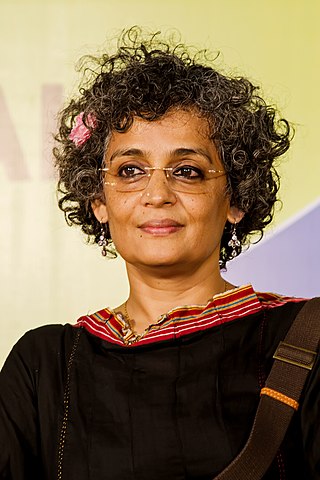
Nur-ud-Din Muhammad Salim, known by his imperial name Jahangir, was the fourth Mughal Emperor, who ruled from 1605 till his death in 1627.

Mirza Shahab-ud-Din Muhammad Khurram, also known as Shah Jahan I, was the fifth Mughal emperor, reigning from 1628 until 1658. During his reign, the Mughals reached the peak of their architectural and cultural achievements.

Suzanna Arundhati Roy is an Indian author best known for her novel The God of Small Things (1997), which won the Booker Prize for Fiction in 1997 and became the best-selling book by a non-expatriate Indian author. She is also a political activist involved in human rights and environmental causes.

The God of Small Things is a family drama novel written by Indian writer Arundhati Roy. It is a story about the childhood experiences of fraternal twins whose lives are destroyed by the "Love Laws" prevalent in 1960s Kerala, India. The novel explores how small, seemingly insignificant occurrences, decisions and experiences shape people's behavior in deeply significant ways. The novel also explores the lingering effects of casteism in India, lending a culturally-specific critique of British colonialism in India. It won the Booker Prize in 1997.

Do Bigha Zamin is a 1953 Indian Hindi-language drama film directed by Bimal Roy. Based on Rabindranath Tagore's Bengali poem "Dui Bigha Jomi", the film stars Balraj Sahni and Nirupa Roy in lead roles. Known for its socialist theme, Do Bigha Zamin is considered an important film in the early parallel cinema of India, and a trend setter.

Syama Prasad Mookerjee was an Indian politician, barrister and academician, who served as India's first Minister for Industry and Supply in Prime Minister Jawaharlal Nehru's cabinet. After falling out with Nehru, protesting against the Liaquat–Nehru Pact, Mukherjee resigned from Nehru's cabinet. With the help of the Rashtriya Swayamsevak Sangh, he founded the Bharatiya Jana Sangh, the predecessor to the Bharatiya Janata Party, in 1951.

Mirza Shah Shuja was the second son of the Mughal Emperor Shah Jahan and Empress Mumtaz Mahal. He was the governor of Bengal and Odisha and had his capital at Dhaka, in present day Bangladesh.

Jahanara Kajjan, or "Miss Kajjan", was an Indian singer and actress active during the 1920s and 1930s, often referred to as the "Nightingale of Bengal". The reigning queen of early talkie movies glamorous movie sensation the trained classical singer, the fashion icon and the trendsetter, Jahanara Kajjan she was known as "Lark of Hindi Cinema" and the "Beautiful Nightingale of Bengal Screen". She along with Master Nissar made most sought after and popular singing pair of the stage and film.

Gulbadan Begum was a Mughal princess and the daughter of Emperor Babur, the founder of the Mughal Empire.
The Hindu Literary Prize or The Hindu Best Fiction Award, established in 2010, is an Indian literary award sponsored by The Hindu Literary Review which is part of the newspaper The Hindu. It recognizes Indian works in English and English translation. The first year, 2010, the award was called The Hindu Best Fiction Award. Starting in 2018 a non-fiction category was included.

Rahmat-un-Nissa, better known by her title Nawab Bai, was a secondary wife of the Mughal emperor Aurangzeb. She gave birth to Aurangzeb's first two sons, including Bahadur Shah I, who became Mughal emperor in 1707. Nawab Bai was unpopular at the Mughal court and lost her husband's favour quite early on in her life while the misconduct of her sons, Muhammad Sultan and Muhammad Muazzam, embittered her latter life. She died in 1691 in Delhi after long years of separation from her husband and children.

Jodha Akbar is an Indian Historical drama television series that aired from 18 June 2013 to 7 August 2015 on Zee TV, also digitally available on ZEE5. The show was produced by Ekta Kapoor under Balaji Telefilms. Starring Rajat Tokas and Paridhi Sharma, critics have praised the series for its acting performances, scope, soundtrack and production values. It replaced Rab Se Sohna Isshq and was replaced by Tashan-e-Ishq in its timeslot.

Kashmir: The Case for Freedom is a collection of essays by Tariq Ali, Hilal Bhat, Angana P. Chatterji, Habbah Khatun, Pankaj Mishra and Arundhati Roy, published by Verso.

Fitoor is a 2016 Indian Hindi-language musical romantic drama directed by Abhishek Kapoor, produced by Siddharth Roy Kapur, and written by Kapoor and Supratik Sen based on Charles Dickens' 1861 novel Great Expectations. The film features Tabu, Katrina Kaif and Aditya Roy Kapur in lead roles. Filming began in Kashmir in November 2014 and concluded in October 2015.
Begum Zaffar Ali, née Sahibzaadi Syeda Fatima, was an Indian women's rights activist and the first woman matriculate of the Indian state of Kashmir and Jammu who went on to become Inspector of Schools in Kashmir. She was an educationist, women's liberation activist, deputy director of education and later a legislator in the Indian state of Jammu and Kashmir. She was associated with the activities of the All India Women's Conference and was its secretary before partition, but a chance meeting with Muhammad Ali Jinnah and his sister, Fatima Jinnah in Kashmir, who would later visit the family for banquets, influenced her and she left the conference to concentrate her efforts in women's liberation movements in the pre-independent India.

Haq Se is an Indian Hindi web series, produced and created by Viraj Kapur and Karan Raj Kohli for Ekta Kapoor's video on demand platform ALTBalaji. The series stars Rajeev Khandelwal, Surveen Chawla and Parul Gulati.
Ira Mukhoty is an Indian author. She studied natural sciences at University of Cambridge.

Bokul Kotha is an Indian Bengali television soap opera that aired from 4 December 2017 to 1 February 2020 on Zee Bangla. The show was produced by Acropoliis Entertainment Pvt. Ltd. and starred Ushasi Ray and Honey Bafna in lead roles and Uponita Bnaerjee, Sumanta Mukherjee, Shreyasree Samanta, Suvajit Kar, Arindam Banerjee and Biplab Banerjee in supporting roles.
The Mahal family is a family that was headed by the matriarch Begum Wilayat Mahal who claimed to be descended from the rulers of the Oudh State in the 1970s; they thus proclaimed themselves as the royal family of Oudh. Members of the family who moved to Delhi lived in Malcha Mahal, a hunting lodge that dates back to the 14th century. The family's claim was disputed by many others, and on 22 November 2019, journalist Ellen Barry published an article in The New York Times claiming that the family had no royal connection and was in fact descended from the former Registrar of the University of Lucknow, Inayatullah Butt.
Nasim Jahan was a women's activist and a politician of the Pakistan Peoples Party. She was married to General Akbar Khan and played a key role, largely unknown, in the First Kashmir War. She was accused as a co-conspirator in the Rawalpindi Conspiracy Case but acquitted. Later she was became a founding member of the Pakistan Peoples Party and was elected to the National Assembly of Pakistan and contributed to the formulation of the Constitution of Pakistan.















